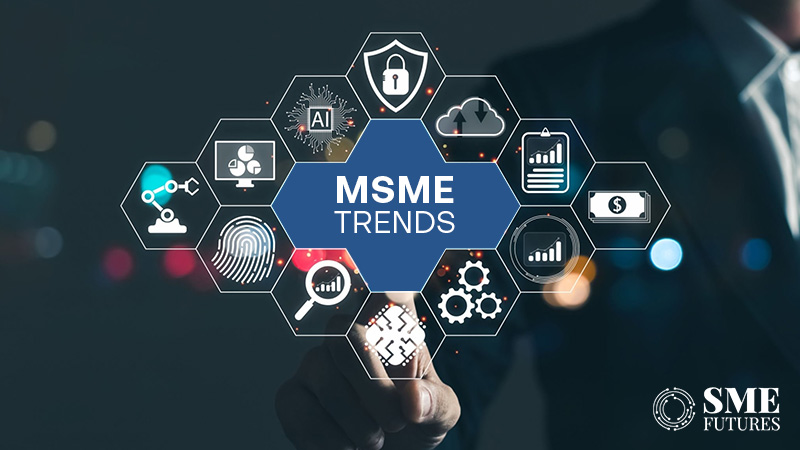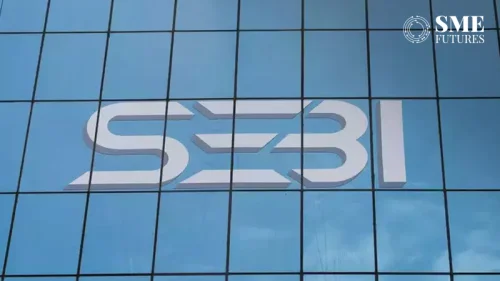The heartbeat of India’s economic engine, the micro, small, and medium enterprises (MSME) sector, is poised to be a driving force in 2024, on account of several factors—government initiatives, a surge in consumer goods demand, and e-commerce penetration.
Currently, India has a total of 633.9 lakh MSMEs. Over 99 per cent of the MSMEs in India qualify as micro-firms, totalling 630.5 lakh enterprises. Also, as of August 2023, MSMEs employed 12.36 crore people in India.
“The manufacturing segment, constituting 30 per cent of all MSMEs, is set to experience a robust rebound, propelled by both domestic and international demand. The integration of automation and artificial intelligence (AI) will elevate productivity and efficiency, with technocrat promoters playing a pivotal role in fostering innovation and expansion,” says Nitya Shah of Kamayakya Wealth Management.
With this, here are some of the prominent trends that MSMEs will poise to witness in 2024.
Digital transformation not a necessity but a strategy
In the dynamic landscape of MSMEs, the surge in digitalisation transcends being a mere trend and stands as a strategic imperative. The seismic shifts in the business ecosystem, especially in SaaS-based accounting, highlight the profound changes unfolding in this landscape as technology intertwines with entrepreneurship.
“MSMEs are not merely adapting to change, they are actively shaping it. The convergence of artificial intelligence, cloud computing, and seamless interfaces is fundamentally altering the financial fabric of businesses,” says Abhijit Dutta, Chief Strategy Officer at Hostbooks, a business solutions provider, as he emphasises that accessibility, security and data protection are the foundations for success.
“For MSMEs, keeping pace with innovation is not a luxury but a vital survival strategy. Companies that once hesitated at the brink of technological evolution are now embracing it, recognising that agility and efficiency are indispensable. From industry stalwarts to e-commerce giants, businesses are navigating this digital transformation,” he adds.
MSMEs to leverage business intelligence
Besides becoming digital and using technology for their operations, MSMEs have increasingly turned to business intelligence (BI) in recent years to gain deeper insights into their data and make informed decisions that drive business growth.
Anurag Sanghai, Principal Solution Architect, Intellicus Technologies, expects significant advances in BI capabilities in 2024, particularly in the retail, manufacturing, and insurance sectors.
“MSMEs expect business intelligence tools to work on six key metrics—data driven decision making, self-service BI, real time analytics, data governance and security, and Integration capabilities,” he says.
Data-Driven Decision Making: Organisations are increasingly relying on data to drive strategic decisions. They expect BI solutions to provide actionable insights, predictive analytics, and prescriptive recommendations. The ability to transform raw data into meaningful business context is paramount.
Self-Service BI: Ease of use and accessibility are crucial. Organisations want self-service BI tools that empower business users to explore data, create reports, and visualize information without heavy reliance on IT. User-friendly interfaces and intuitive dashboards are highly sought after.
Real-Time Analytics: The demand for real-time insights is growing. Businesses expect BI platforms to process and analyse data in near real-time, enabling agile responses to market shifts, customer behaviour, and operational challenges.
Data Governance and Security: As data volumes increase, so do concerns about data privacy, compliance, and security. MSMEs seek robust data governance frameworks within their BI systems to ensure data accuracy, lineage, and protection.
Integration Capabilities: BI tools must seamlessly integrate with existing systems, databases, and cloud platforms. MSMEs look for interoperability to avoid data silos and enable cross-functional analysis.
Rise of technocrat promoters
Speaking about MSME trends, Nitya Shah feels that technocrat promoters are going to play an important role. These individuals, equipped with substantial technical knowledge and experience, will be instrumental in fostering innovation and expansion within MSMEs.
“In 2024, the trend of more technocrat promoters entering this sector is anticipated to grow. Their proficiency in technical matters, coupled with their problem-solving abilities and strategic insight, is poised to propel MSMEs forward,” she says.
Another key indicator for the industry’s progress and health can be measured via order book expansions. “In 2024, I expect to see a significant increase in order book expansions, reflecting the growing demand for MSME products and services which will continue to boost the economy,” she enthuses.
Rise of gold loans for MSMEs
2023 witnessed a marked shift in awareness about gold loans for MSMEs. This will continue, affirms Rajesh Shet, Co-founder & CEO, SahiBandhu, a gold loan aggregator platform.
According to him, in the last three years, there has been a remarkable increase in disbursals for gold loans for MSMEs. “It has increased from 12 per cent to over 30 per cent over the last three years. MSMEs are actively seeking loans against gold to meet their working capital requirements, an upward trend that is expected to continue well into 2024,” he contends.
In 2024, Shet predicts that the demand for gold loans from MSMEs will increase. Several factors are driving this demand, such as rising input costs, supply-chain disruptions, and shortage of labour. Accelerated adoption of digital technology will also impact the gold loan market, and fintech companies will play a key role in digitising the gold loan process.
“We anticipate an increase in gold prices in 2024, which would make gold loans even more attractive for MSMEs, making loan repayments easier. The market for gold loans is also evolving, and competition is set to intensify. This will lead to more competitive interest rates and better terms and conditions for MSMEs. Also, gold loan providers will focus on rural markets, since many MSMEs are in the hinterlands,” he says.
Beyond this, gold loans will also evolve, incorporating technology to improve customer service, utilising alternate data to assess creditworthiness, and developing a more efficient and transparent loan process.











